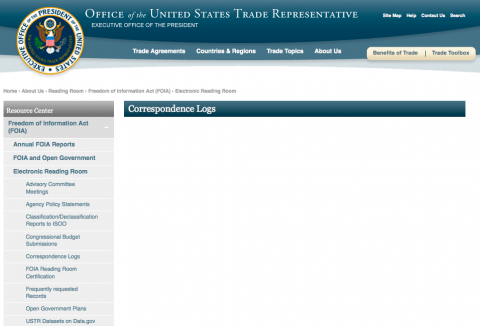It's no secret that the US Trade Representative (USTR) has approached the Trans-Pacific Partnership (TPP) negotiations with a disappointing lack of transparency. For years now, leaks have been an inadequate substitute to reasonable public policy, and non-corporate groups have resorted to reading between the lines of press statements even as the stated timeline of the agreement has blown by.
There's another tool that members of the public can use to pry information out of agencies like the USTR: the Freedom of Information Act (FOIA). Through FOIA, groups like EFF can demand certain kinds of information, and the agency has a legal obligation to provide it. To that end, we've filed a FOIA request for correspondence records between USTR negotiators and corporate lobbyists about the TPP. When we receive responsive documents—likely some time in the new year—we'll go through them and release what we've found.
This isn't the first time a public interest group has used FOIA request to uncover this sort of information. In fact, our request builds specifically on earlier requests from IP-Watch and Knowledge Ecology International, which helped the public understand the cozy relationship between lobbyists and negotiators up to that point, in 2013. Our new request seeks to expand on the information discovered through that request and bring it up to date.
It's nice that freedom of information laws make it possible for the public to pull that information from agencies—but really, these agencies owe it to the public to simply make it available, without being asked. As powerful as FOIA can be, it generally comes with a wait of weeks or months for records; and though it is available to the public at large, many people are intimidated by the process of making demands of federal agencies.
The idea that the USTR should be making information more available and accessible as a default is not a radical one. In fact, if you look through the agency's web site you'll see, as is typical on many government agency sites, an "Electronic Reading Room" of public information. The USTR's reading room bears this description: "This page contains information routinely available to the public as well as documents frequently requested under the Freedom of Information Act."

An empty page greets visitors seeking "Correspondence Logs."
Under that, it's blank. But the navigation menu on the left suggests categories, like "Advisory Committee Meetings." But the page that one pulls up is also blank. "Correspondence Logs" also leads to a blank page, despite the 127 pages released in response to the aforementioned IP-Watch request. "Visitor Logs," another category that might potentially reveal embarrassing proximity to lobbyists, is also empty.
Finally, in the main navigation section of the site, there's a category called "FOIA releases." It's not empty, but it hasn't been updated since 2012—before the head of the USTR, Michael Froman, even stepped into his current role.
The fact that there are empty pages where that information ought to be is a pretty clear indicator that the calls from EFF and others for more transparency are not extreme. These are basic requests, encoded into the architecture of federal agency sites, and they're requests that the USTR is repeatedly and continuously ignoring.
We'll report back when we get the results of the FOIA request we've filed. We encourage the USTR to post the responsive documents publicly as well. Look to the example of the European Commission's release of Transatlantic Trade and Investment Partnership meeting details and negotiating texts: At a time when governments around the world are responding—slowly—to public calls for transparency, it's a stark and disappointing reality that the USTR won't even publish its public records.








